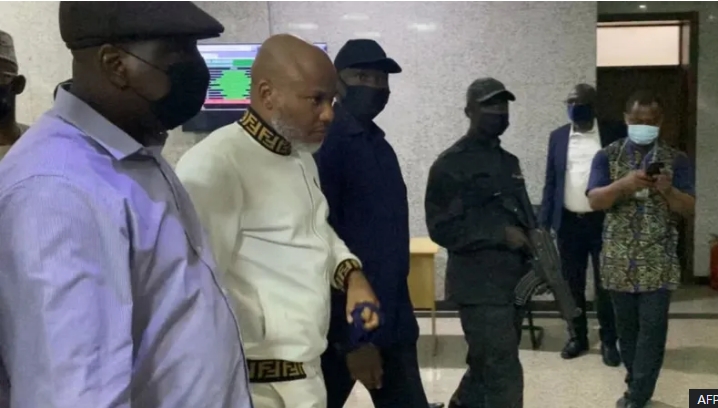
Ayomidele Oluwasusi
Barrister Aloy Ejimakor, Special Counsel for the illegally-detained leader of the Indigenous People of Biafra (IPOB), has announced that Nigeria’s secret police, the Department of State Services (DSS), finally allowed Kanu to meeet with his doctor on Wednesday.
Ejimakor, however, said that the preliminary report of the doctor’s examination of Kanu presented complex medical conditions that required that the IPOB leader should urgently be taken to a hospital for a more detailed diagnosis.
“Today, DSS finally allowed Nnamdi Kanu’s physician to see him,” the attorney confirmed to investigative news outlet, Sahara Reporters.
“The Doctor’s preliminary report presented complex medical conditions that require that Nnamdi Kanu be taken to a hospital for a more detailed diagnosis. This will follow a report that will be sent to DG-DSS by the Doctor.”
Ejimakor had on Tuesday expressed concern over Kanu’s deteriorating health.
He said Kanu was experiencing shortness of breath, low blood pressure, and general malaise.
He stated that Kanu requested medical attention from his personal physician, and subsequently, his legal team submitted a formal request to the DSS to grant access to Kanu’s doctor. However, when the doctor arrived at the DSS headquarters on Tuesday, he was denied access to Kanu.
Kanu is facing trial on terrorism charges levelled against by then-President Muhammadu Buhari’s administration over his call and agitation for a sovereign state of Biafra. Kanu was extraordinarily renditioned from Kenya in June 2021 by former President Buhari’s government and has remained in detention since then.
Mr Kanu’s initial arrest in 2015 triggered protests by his supporters.
In 2017, Justice Binta Nyako of a Federal High Court in Abuja granted Kanu bail.
Upon his release, a military invasion of his ancestral home in Umuahia, Abia State, in September 2017, forced into exile, hence he did not attend his trial on the next scheduled date and thereafter. From then till June 2021 when he was abducted from Kenya and was subjected to “extraordinary rendition”, and brought back to Nigeria, there has been a robust public debate as to whether he jumped bail or not.
But, the Appeal Court had discharged and acquitted Kanu of all terrorism charges. This judgment was later overturned by the Supreme Court which transferred the case back to the Federal High Court.
Kanu’s attorney, Aloy Ejimakor, in January, clarified that the Supreme Court had settled the controversy on whether Kanu jumped bail or not.
The attorney said the Supreme Court also clarified that Kanu’s bail “should not have been revoked”.
In the Certified True Copy (CTC) of the judgment delivered in December 2023, the apex court declared that Kanu did not jump bail.
IPOB wants a group of states in the south-east of Nigeria, which mostly comprises the Igbo ethnic group, to break away from the country and form an independent nation called Biafra.
In 1967 Igbo leaders declared independence for the state of Biafra, but after a civil war, which led to the deaths of millions of people, the self-determination movement was defeated.
But the idea of Biafra has never gone away and despite arrests of his members, Mr Kanu’s movement hasseen a recent swell in its numbers.
All peoples have the right to self-determination. By virtue of that right they freely determine their political status and freely pursue their economic, social and cultural development, according to the United Nations Charter.
Essentially, the right to self-determination is the right of a people to determine its own destiny. In particular, the principle allows a people to choose its own political status and to determine its own form of economic, cultural and social development. Exercise of this right can result in a variety of different outcomes ranging from political independence through to full integration within a state.
KOIKI Media bringing the world 🌎 closer to your door step
